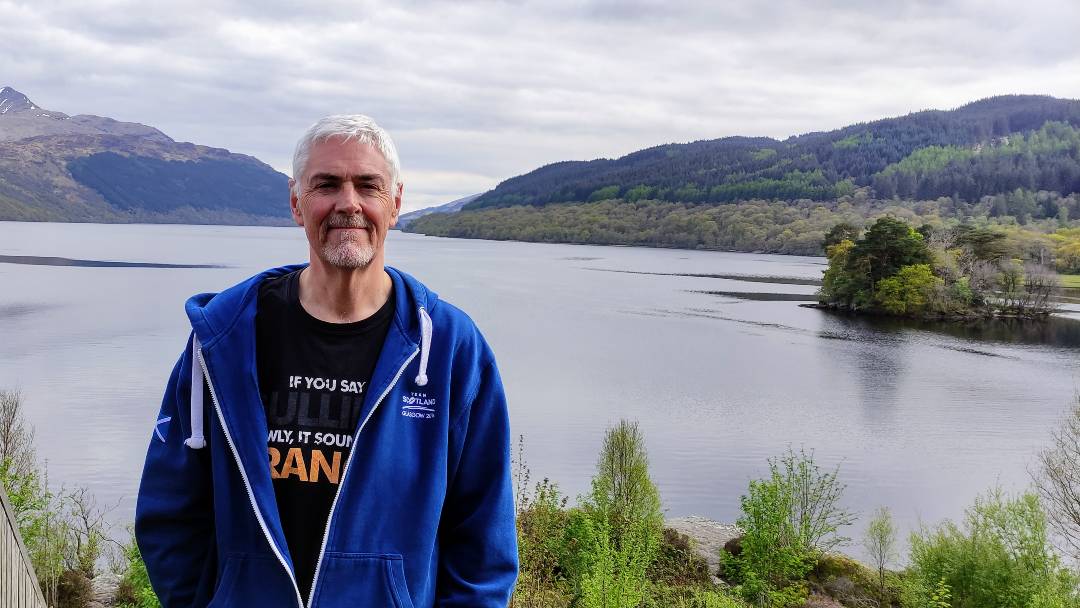This Friday sees Dr Gary Tanner retire as director of psychological services after 26 years’ service in the NHS.
Gary (58) originally from Knightswood in Glasgow but now living in Uddingston, started out in the psychology department at Dykebar Hospital in Paisley in 1996 before joining NHS Lanarkshire and the psychology department in East Kilbride in 2001 – via a spell at the Royal Cornhill Hospital in Aberdeen.
He said: “In those days, psychologists tended to move around quite a bit so I thought I’d be in Lanarkshire a couple of years and move on, but I’ve been here ever since.
“Thinking back to when I started in the NHS, I wanted to find a niche and something that I was passionate about and enjoy doing. For me it was addictions. People say working with those who have substance misuse problems must be challenging, but when you get that moment of success when someone changes their behaviour then there’s real job satisfaction.
“That was my niche and I set about building an addiction psychology service from the ground up. Over the years, I’ve been able to build really good relationships and work with some great people to help me deliver a more efficient and more effective psychology service that meets the mental health needs of the people of Lanarkshire. As a team, we have so many things to be proud of.”
Gary’s role was initially split between working in primary care psychology and the Hamilton community addiction team. Within a couple of years, he set up a brand new addiction psychology service and by 2004 was made clinical director for addiction services, before becoming director of psychology in 2012 - with a little bit of persuasion.
Gary recalled: “The director of psychological services was a new role, pulling together different strands of psychology within a single head of profession. I hadn’t intended to apply for the job as I was enjoying my role as addictions clinical director.
“They interviewed internally and then externally for the post, and I was approached by the director of planning at the time, Colin Sloey, and he more or less said to me ‘Gary, it’s your profession, it’s time to stand up, and apply for the job’, and the rest is history.”
Since 2012 the service has achieved so much and has almost doubled in size.
Gary said: “One of the biggest challenges has been keeping up with demand for mental health services. When I first started out in the profession, you would get referrals from GPs for people with dog phobias or wasp phobias and fairly straightforward difficulties.
“Nowadays it’s much more complex problems that we see. People with complex trauma, significant anxiety or depression in their lives. The job is harder now, the public are a lot more aware of psychological therapies nowadays which is a very good thing, so they are now asking for it and the GPs are referring more people to our service.
“We’ve had to continually develop new ways of working. We’ve developed our website and online digital therapy programmes, giving people of Lanarkshire better and quicker access to a whole range of psychological therapies for many different issues.
“This supports the existing face-to-face work the psychologists, nurse therapists, counsellors, and psychological practitioners deliver. We are now delivering a real hybrid of a service, all of it tailored to the individual. Our online resources increase the options but there will always be people that need face-to-face contact. It’s a hybrid model that other health boards have copied as it increases access to psychological therapies.”
On the director role, Gary admits to missing the direct clinical contact with patients.
He said: “I’ve had to focus on the bigger picture so I can make a difference top down and that’s how I rationalise it to myself. I’m no longer on the frontline, but I’m still making a difference by designing and developing services, and trying to be more efficient and effective.
“Sometimes you have to work through other people and I’ve been really lucky to have such a fantastic team of department heads, leads, and consultants. I firmly believe that a good leader surrounds themselves with even better people. I have to rely on the experts that are running specialist psychology services for older adults, learning disabilities, addictions, and forensic psychology – amongst many others.
“I’ve really enjoyed helping staff develop, seeing people come in to the service as assistants and trainees, complete their masters or doctorate degree, and progressing through the years to become consultants, or heads of department.
“Recently, the very first person I recruited to Lanarkshire as an assistant psychologist has become the deputy director. It’s rewarding to see that succession planning in action. I’ve always tried to be down to earth and have an open door policy for anyone to come in for a chat. I think that’s important.”
In 2020, the psychological services became one of the first non-medical department in Scotland to be awarded university status by Glasgow Caledonian University. Gary was also made an honorary fellow by Strathclyde University last year and between 2017 and 2019 was the Scottish Government speciality advisor for psychology to the chief medical officer.
“It was good to be recognised as an expert in psychology and take on that important role on top of the day job. Of course, everything is on top of the day job!”
When the day job finally ends at the end of June, what lies in store for Gary?
He said: “I may be retiring from the NHS but I’ll still be involved in some other projects. I’m co-writing some papers with researchers at Strathclyde University and I also chair fitness to practise panels for the Nursing and Midwifery Council, as a lay member.
“I also sit on fitness to practise tribunals for the Health and Care Professions Council that regulates psychologists and a trustee on the board for the Richmond Fellowship Scotland Charity, one of Scotland’s biggest social care charities.
“That will all keep me busy. I also bought a 22-year-old motorhome last year and I’ve been out in it a few times with my wife, Val, and my kids, Katie and Abby. One of my consultants got me a great book of road trips across Ireland, and I can’t wait to get across the Irish Sea. I’m also looking forward to enjoying Scotland and the freedom to do what I want and visit new places.
“My wife is Canadian so we are going to Canada to see family for three weeks when I retire. It’s a good way to end my time at the NHS and not have to worry about coming back to hundreds or even thousands of emails!
“I’m also a member of the Tartan Army and go home and away to support Scotland. I’m just back from a double header trip to Dublin and then Armenia, via Denmark, Turkey, Greece and the Netherlands. My wife told me I’m getting too old to sleep in airports and planes following Scotland everywhere but it was one last hurrah!”



